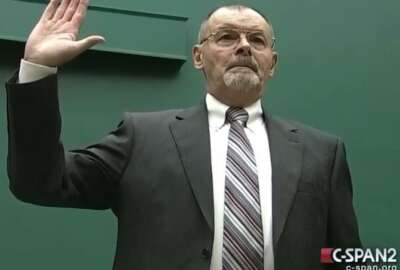
Whistleblower allegations cause Biden Pentagon nominee to withdraw
In today's Federal Newscast: A POTUS Pentagon nominee resigns under a cloud. The Government Publishing Office announces a new telework policy. And the latest Postal...
To listen to the Federal Newscast on your phone or mobile device, subscribe in PodcastOne or Apple Podcasts. The best listening experience on desktop can be found using Chrome, Firefox or Safari.
- President Biden’s nominee to be the Pentagon’s top acquisition official is taking his name out of the running. In a letter to Defense Secretary Lloyd Austin, Michael Brown said he was concerned that an ongoing inspector general investigation into whistleblower allegations against him would delay his confirmation for more than a year. Brown has served as director of DoD’s Defense Innovation Unit since 2018. Pentagon Spokesman John Kirby said Brown still leads DIU, and the department has no plans to change that. (Federal News Network)
- The Biden administration nominated a key official for the future of United States space operations. The president is tapping Maj. Gen. Michael Guetlein as the first leader of Space Systems Command. The command is expected to stand up this summer and is in charge of developing, acquiring, fielding and sustaining space capabilities in the military. The Space and Missile Center will also fall under the umbrella of the command. SMC launches satellites for the Space Force. Guetlein is currently serving as the deputy director of the National Reconnaissance Office.
- A U.S. reserve cadre of civilian cyber experts is one step closer to reality. The Homeland Security and Government Affairs Committee advanced the “Civilian Cyber Security Reserve Act” to the Senate floor yesterday. Under the bill, agencies could appoint civilian cyber reservists to federal civil service positions for up to six months at a time. The voluntary reservists would also be eligible to get security clearances. The proposed program is based on a recommendation from the National Commission on Military, National and Public Service.
- One of the earliest agencies to settle on a post-pandemic telework policy is in the Congressional branch. The Government Publishing Office will let employees capable of telework and/or remote work do so full time. The policy applies to about a third of the GPO’s 1,500 employees, those that do not have to operate machinery in GPO’s printing and binding plants. Dan Mielke, Chief Human Capital Officer, said one 17-member workgroup will go 100% telework, after conferring with its manager. Director Hugh Halpern said the policy reverses the pre-pandemic grudging allowance to fully embracing telework. (Federal News Network)
- Almost all military bases (95%) have removed their COVID-19 travel restrictions. None of the bases still under the Defense Department limits is in the continental United States. The restrictions keep service members from moving from one base to another without a waiver and disallows troops from traveling too far from base. Most of the installations with limits are in Japan.
- A group of Senate Democrats wants agencies to make their reentry and pandemic safety plans available to the public. Sen. Mark Warner (D-Va.) and Sen. Tim Kaine (D-Va.) reintroduced legislation designed to keep federal employees informed about their agencies’ safety plans. Sen. Chris Van Hollen (D-Md.) and Sen. Ben Cardin (D-Md.) are co-sponsors. Rep. Gerry Connolly (D-Va.) reintroduced a House companion earlier this year, naming it after one of his constituents, a federal employee, who died from complications due to COVID-19.
- The Department of Veterans Affairs said it will reimagine its massive electronic health record project after finding widespread problems with the initial rollout. VA is developing a new budget, deployment schedule and management structure for the project. VA Secretary Denis McDonough said, “Most challenges were not breakdowns of the technology, nor of the great people at Mann-Grandstaff, who did the best they could in the worst of circumstances, implemented this program in the heart of a pandemic, dutifully shared findings that improved the system and ensured that our veterans were safe despite the challenges they faced. Instead the missteps were ours, at Veterans Affairs and Cerner.” (Federal News Network)
- Ransomware will be a top issue on Capitol Hill in the coming weeks. The House Committee on Energy and Commerce will hold a hearing titled “Stopping digital thieves: The growing threat of ransomware” this coming Tuesday. And a week after that, the Senate Judiciary Committee is inviting top government officials to testify on their response to ransomware attacks The public hearings come after ransomware events have impacted hundreds of companies, including a leading meatpacking plant in June and the Colonial Pipeline attack in May. Recorded Future, a cybersecurity firm, said there were 65,000 ransomware attacks last year alone.
- The Postal Service’s inspector general warned aspects of the USPS 10-year reform could result in regional or widespread service issues, and might not save the agency as much money as it projects. The IG’s office is asking Congress for a $263 million budget in fiscal 2022. That’s $13 million above current levels. Tammy Whitcomb, USPS Inspector General, said the money would increase staffing and provide continuous monitoring of USPS delays. “The sooner we get these funds, the sooner we can build this capacity to provide more effective and timely oversight,” Whitcomb said. (Federal News Network)
- The State Department sheds light on how it will correct a massive passport-processing backlog. The State Department is directing a surge of employees and contractors to return to the office and process a backlog of applications made worse under the pandemic. Deputy Assistant Secretary for Passport Services Rachel Ardnt said it is taking 12 to 18 weeks to process applications already received, and new applicants will not get their passports until well into the fall. The department’s Bureau of Consular Affairs has limited appointments available for individuals with urgent international travel within 72 hours, or in life-and-death emergencies.
- The National Institute of Standards and Technology awards more than $150 million to promote innovation in the biopharmaceutical industry. The funds will go to the National Institute for Innovation in Manufacturing Biopharmaceuticals for the development of vaccines, monoclonal antibodies, gene therapies and other medical products. More than half of the funding comes from the American Rescue Plan to support further preparedness and responses to coronavirus outbreaks. The institute, which started in 2017, consists of more than 180 biotechnology companies, equipment manufacturers, academic institutions and nonprofits.
Copyright © 2025 Federal News Network. All rights reserved. This website is not intended for users located within the European Economic Area.
Peter Musurlian
Peter Musurlian is a producer at Federal News Network.
Follow @PMusurlianWFED





